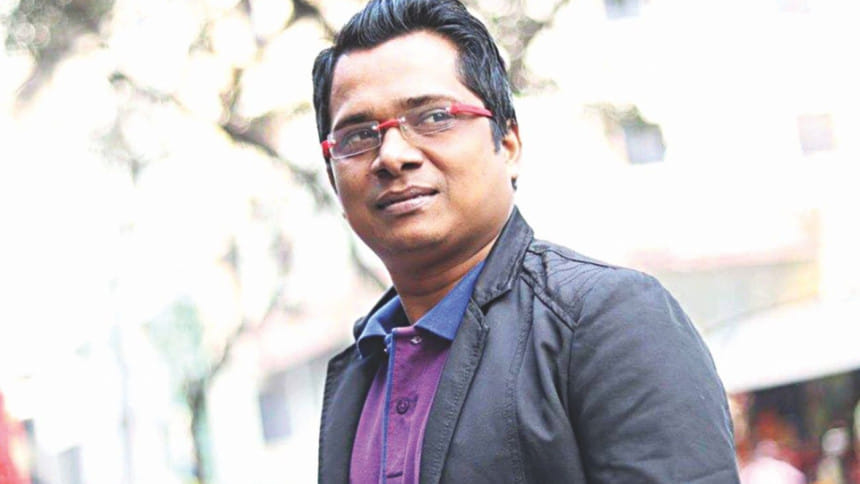Growing Up With Pen and Paper: Masud Pathik's journey as a writer

"A writer has to accept the fact that people will be against them." This is a fact, stated and accepted by Bangladeshi film director, lyricist and poet, Masud Pathik. Born in November 1976, Masud Pathik has been involved in writing since the ripe age of 6. "My youngest maternal uncle, Mohsin Khandakar, who is a teacher now, used to write rhymes. He was perhaps my first inspiration to become a writer myself. Like him, I began with rhymes." From classes 6-9, Masud was preoccupied with rhymes mostly, and also had his works published in children's magazines.
He moved to Dhaka from Narsingdi for his intermediate examinations. "The new environment, new people, new atmosphere urged me to write more. That is when I transitioned from rhymes to poetry."
Throughout his youth, Masud had very little encouragement for what he did. "My parents, and the society I grew up with, did not support my writing career. I was a good student at school and so they wanted me to go into a more academic line with clearer career prospects. "But my maternal grandfather, Fazlul Huq Khandakar, was a man of morals. And his morality inspired my greatly. He used to work in the field of agriculture and farming, and would always be around farmers. Staying with him, I learned of their lifestyle, their philosophies, their hardships and that reflected in my writing all throughout."
When Masud applied to Dhaka University to study Bengali Language, he was, once again, under scrutiny from his family and society. But he was adamant of learning what he was passionate about. During his first year at university, he published his first book Krishokphool. After his first publication, he joined an anti-establishment group with his university mates and decided against publishing in dailies. "We had our own magazines then, mine was called Bratya, which is now the name of my production house." For 6 years, he was a part of that group. "I have to say, I learned very little through my classes at university and learned more from this study circle we created. There, we would discuss philosophy, history, anthropology and so much more. That was what helped me grow the most." He later did his Master's in Linguistics.
In 2006, he began writing for publishing houses and newspapers again. And until now, has 14 books to his name including Chashar Put, Ekaki Jomin, Shetu Harabar Din, and many more. His book Chashar Bachan was published last December, and books Langoler Bhubon and Dadar Khorom are all set to be released in this year's Ekushey Boi Mela. Masud then branched out into filmmaking. "Cinema and poetry are the same to me. Most of the cinemas I have made are visual representations of poetry. His latest project 'Maya- the lost mother' is a film based on artist Shahabuddin's painting- The Woman. Another upcoming project of his is 'Kobi Gaach- Poetree'
Masud Pathik has also earned a Ph.D in Bangladeshi Cinema at the University of Dhaka. He initially began his career as a freelance writer and a lecturer of Bengali language and literature at a college. He also successfully completed a one-year diploma course at the session 2000-2001 from Theatre School, Dhaka. He also took part in a film appreciation course in 2008 organised by Biswa Shahitya Kendra in Dhaka.
Pathik now edits his magazine, Bratya, which mainly focuses on the life and livelihood of the subaltern people of Bangladesh. He also acts as the assistant editor of Pothorekha, a literary magazine in Bangladesh, and he is an executive member of Jatiyo Kobita Parishad, Bangladesh. Pathik is also the founder and chairman of Bratya Film, Bratya Creation, and founder and president of World Ecology and Autism Film Forum.
Among the many accolades, including the Kali o Kalam Literary award in 2013, and the Ritwik Ghatak Padak, Masud Pathik won the Bangladesh National Film Award for 2014 for his film Nekabbarer Mahaproyan which he directed and produced, and wrote the lyrics for. The film won seven National Film Awards including Best Film and Best Lyrics.
With the current threat to writers across the country, Pathik wants aspiring writers to remember the history of scrutiny that writers have faced throughout generations. "Your passion has to be undying, no matter the circumstance. Writers are the best narrators of time, and with time, there is progress. And there will always be groups of people against progress. We must still move on. We must accept the fact that we will be scrutinised, that there will be people who want to cause harm to us. If all writers succumbed to fear, who will pen the important words that we need to read? We must be adamant, we must accept, we must keep writing."

 For all latest news, follow The Daily Star's Google News channel.
For all latest news, follow The Daily Star's Google News channel. 



Comments